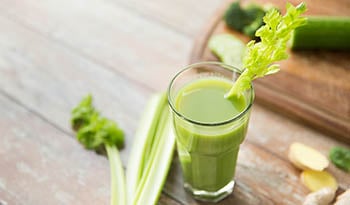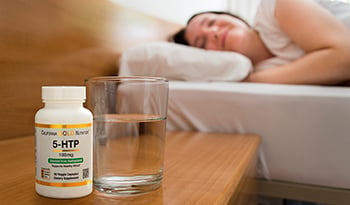Have Gas And Feeling Bloated? Here's What Your Gut Is Telling You
DISCLAIMER:This blog does not intend to provide diagnosis...
- In this article:
- What Does It Mean If Gas and Bloating Occur Within 30 Minutes of Eating?
- What Does It Mean If Gas And Bloating Occur Between 45 Minutes to 2 Hours After Eating?
- What Does It Mean If Gas And Bloating Seem To Be Present All Of The Time?
- What Does It Mean If Gas And Bloating Are Accompanied By Cramps?
- Can Probiotics Help With Gas and Bloating?
- Final Comments

Excessive gas and bloating are common digestive complaints that usually respond very well to natural solutions. The key is to get on the right path, and sometimes it takes a bit of detective work.
Keeping a diary of what foods you are eating along with when gas and bloating occurs and severity may help identify triggers. It is worth the effort, especially if the issues have been around for a long while.
What Does It Mean If Gas and Bloating Occur Within 30 Minutes of Eating?
If gas and bloating generally occur within 30 minutes after eating, it often is due to a lack of gastric hydrochloric acid (HCL) secretion. Some studies have found low output of stomach HCL in over half of those over age 60 as the ability to secrete gastric acid tends to decrease with age.1 Fortunately, taking HCL as a dietary supplement can help supply what the body may not be producing.
The recommended adult dosage for HCL replacement therapy is one or two 500 mg capsules with meals up to three times daily. The product should contain the enzyme pepsin or a fungal protease to digest protein as well.
A Note on Safety: Do not take HCL on an empty stomach, take it after a few bites of food. Consult a health care practitioner prior to use if suffering from active peptic ulcer, during pregnancy, or while breastfeeding. Keep out of reach of children.
What Does It Mean If Gas And Bloating Occur Between 45 Minutes to 2 Hours After Eating?
There are several factors that can lead to gas and bloating occurring 45 minutes to two hours after a meal:
- Lack of digestive enzymes and food intolerance.
- Overgrowth of yeast or bacteria in the small intestine.
- Dietary factors such as sugar, FODMAPs, and other foods that cause gas and bloating
Digestive Enzymes For Gas And Bloating
Digestive enzymes are secreted along the digestive tract to break food down into nutrients and waste. Sometimes the body may not produce or secrete enough enzymes and this insufficiency can lead to gas and bloating.2,3 Taking supplemental digestive enzymes can overcome this insufficiency.
Digestive enzymes can help to:
- Relieve the bothersome issue of gas and bloating as improperly digested food is a big factor in producing these symptoms.
- Soothe digestive distress. If food is not digested properly, food compounds can irritate and potentially damage the sensitive intestinal lining. Over time, this irritation can lead to inflammation and a leaky gut.
- Improve the microbiome and bowel function. Promoting proper digestion encourages a healthy intestinal environment, and helps relieve occasional constipation and irregularity.
Often it is not the foods that a person is eating that is really causing the problem with gas and bloating, it is the lack of digestive enzymes. A good example of this situation is lactose intolerance. Lactose is a sugar found in milk. Lactase is an enzyme that lies on the surface of the small intestine that breaks the bond of the two sugars that compose lactose. If the body is not producing enough lactase, the lactose is not broken down and it can result in gas, bloating, or even diarrhea.
Dietary supplements containing the enzyme lactase are very effective at breaking down the lactose when taken at the time of milk consumption in preventing the gas and bloating in lactose-intolerant individuals.4
The same sort of situation occurs with other components of food that can cause gas and bloat. If the enzyme that is required to break down a particular food component is not there in sufficient quantities, there is going to be gas and bloating. That is why digestive enzyme supplements are such a key consideration with common digestive issues. Not only does taking a high potency digestive enzyme formula with each meal help with breaking down foods that if not properly digested can cause gas, bloating, and either constipation or diarrhea; digestive enzymes also act as a deterrent for bacterial and yeast overgrowth in the small intestine.
As there are considerable differences in potency and quality of digestive enzymes in the marketplace the best advice is to choose well-respected brands and follow label instructions. Best results are most often achieved by taking digestive enzymes just before eating or after a few bites of food.
Berberine For Overgrowth Of Yeast Or Bacteria
Berberine also reduces the overgrowth of yeast or bacteria in the small intestine
Berberine is an alkaloid found in many plants including goldenseal (Hydrastis Canadensis) and barberry (Berberis vulgaris). In a clinical study in patients with gas, bloating, and an increased number of bowel movements daily, berberine produced significant improvements in bowel symptoms and function.5 Several mechanisms are responsible for this effect, but the key may be reducing the levels of yeast and bacteria in the small intestine as well as improving intestinal motility. The recommended dosage is 500 mg before meals.
Sugar, Fodmaps, And Other Foods That Cause Gas And Bloating
Several dietary factors are linked to chronic gas. In particular, meals too high in sugar and fermentable food components (FODMAPs) found in most fruit and vegetables. Eggs, beer, and carbonated drinks are also big culprits.
Simply eliminating the offending food (e.g., sugar) in the diet is effective in many cases in dramatically improving gas and bloating. In regard to a low FODMAP diet, since many of the food sources are actually health-promoting foods there may be a better way. One clinical trial showed that supplementing with the enzyme alpha-galactosidase alone with meals produced equal results compared to a low FODMAP diet in people with chronic gas and bloating.6 Rather than taking only alpha-galactosidase, I recommend a more comprehensive digestive enzyme formula.
What Does It Mean If Gas And Bloating Seem To Be Present All Of The Time?
In this situation, I would definitely recommend digestive enzymes along with berberine if the stools are loose and more frequent. If constipation is an issue, I recommend a special type of dietary fiber, partially hydrolyzed guar gum. If you have issues of gas and bloating Natural Factors’ Organic Low FODMAP Reliefiber it is certified to be low in FODMAPs and clinically recognized to maintain digestive health and relieve symptoms of gas, bloating, and bowel regularity.7 For best results, take 3 to 5 grams at night, an hour or so before going to bed. The goal is to trigger an easy bowel movement in the morning.
What Does It Mean If Gas And Bloating Are Accompanied By Cramps?
In this situation, I would recommend digestive enzymes, Natural Factors’ Organic Low FODMAP Reliefiber, and enteric-coated peppermint oil. This last recommendation utilizes peppermint oil in specially coated capsules that won’t break down in the stomach. An enteric-coated preparation prevents the oil from being released in the stomach, allowing it to reach the small and large intestines where it improves the proper tone of intestinal muscles. Several double-blind studies have shown enteric-coated peppermint oil capsules to be very effective in improving gas, bloating, and bowel health.8 The dosage is one or two capsules three times daily twenty minutes before meals.
Can Probiotics Help With Gas and Bloating?
Probiotics are the beneficial bacteria that inhabit the human intestinal tract. Probiotics exert many mechanisms to improve human health.9 Two important probiotic bacteria are Lactobacillus species and Bifidobacteria species.
Health Benefits of Probiotics Noted by Clinical Research:
- Promotion of Proper Intestinal Environment and Function
- Enhancement of Gastrointestinal Tract Immunity and Systemic Immunity
- Supporting the Health of the Microbiome
- Preventing and Helping the Recovery from Antibiotic-associated Diarrhea
Probiotics can help improve gas and bloating in some cases, but if the gas and bloating are due the overgrowth of bacteria in the small intestine probiotic supplements may make these symptoms even worse.
The dosage of probiotic supplements is most often based on the number of live organisms present in the product referred to in colony-forming units (CFUs). Successful results are most often attained by taking between 5 billion and 10 billion CFUs per day with multi-strain formulas. Higher dosages are not necessarily more effective for general health, but higher dosages (30 to 100 billion CFU daily) are often used in prevention and recovery from antibiotic-associated diarrhea.
Final Comments
Eating in a relaxed manner with mindfulness and thoroughly chewing your food helps to improve overall digestive function. Avoid eating under stress or in a hectic environment. Stress is often a key factor in disrupting digestive function as it can disrupt digestive secretions as well as the rhythmic contractions of the intestine that propel food through the digestive tract. Strategies to decrease stress, such as physical exercise, meditation, yoga, and tai chi have been shown to produce significant improvements in digestive function. Getting enough sleep each night is also helpful for improving digestion.
References:
- Schubert ML. Functional anatomy and physiology of gastric secretion. Curr Opin Gastroenterol. 2015 Nov;31(6):479-85.
- Ianiro G, Pecere S, Giorgio V, et al. Digestive Enzyme Supplementation in Gastrointestinal Diseases. Curr Drug Metab. 2016;17(2):187-93
- Roxas M. The role of enzyme supplementation in digestive disorders. Altern. Med. Rev. 2008;13(4):307–314.
- Corgneau M, Scher J, Ritie-Pertusa L, et al. Recent advances on lactose intolerance: Tolerance thresholds and currently available answers. Crit Rev Food Sci Nutr. 2017 Oct 13;57(15):3344-3356.
- Chen C, Tao C, Liu Z, et al. A Randomized Clinical Trial of Berberine Hydrochloride in Patients with Diarrhea-Predominant Irritable Bowel Syndrome. Phytother Res. 2015 Nov;29(11):1822-7.
- Tuck CJ, Taylor KM, Gibson PR, Barrett JS, Muir JG. Increasing symptoms in irritable bowel symptoms with ingestion of galacto-oligosaccharides are mitigated by [alpha]-galactosidase treatment. Am. J. Gastroenterol. 2018;113:124.
- Yasukawa Z, Inoue R, Ozeki M, Okubo T, Takagi T, Honda A, Naito Y. Effect of Repeated Consumption of Partially Hydrolyzed Guar Gum on Fecal Characteristics and Gut Microbiota: A Randomized, Double-Blind, Placebo-Controlled, and Parallel-Group Clinical Trial. Nutrients. 2019 Sep 10;11(9):2170.
- Khanna R, MacDonald JK, Levesque BG. Peppermint oil for the treatment of irritable bowel syndrome: a systematic review and meta-analysis. J Clin Gastroenterol. 2014 Jul;48(6):505-12.
- Lee ES, Song EJ, Nam YD, Lee SY. Probiotics in human health and disease: from nutribiotics to pharmabiotics. J Microbiol. 2018;56(11):773-782.

 By Dr. Michael Murray, N.D.
By Dr. Michael Murray, N.D. 


